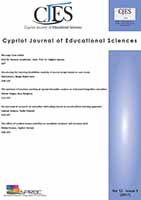The opinions of teachers working at special education centers on inclusive/integration education
The opinions of teachers working at special education centers on inclusive/integration education
Author(s): Ahmet Doğanay, Ayşe BengisoySubject(s): Education, Inclusive Education / Inclusion
Published by: Birlesik Dunya Yenilik Arastirma ve Yayincilik Merkezi
Keywords: Inclusion/integration; special education; special education teachers; opinions on inclusion / integration;
Summary/Abstract: This study was conducted with the purpose of finding out the opinions of teachers working at special education centers about inclusive education. The study was conducted with teachers working at a special education center in Famagusta, Turkish Republic of Northern Cyprus, in the academic year of 2016-2017. Qualitative methodology was used in the research. Using semi-structured interview technique, face-to-face interviews were held with teachers of various ages, length of service, gender and of different undergraduate and graduate degrees who work at the special education center. Face-to-face interviews were recorded with voice recorders. The teachers were first informed on the reason of the interview and the reason for which the data would be used. Descriptive analysis technique was used in the analysis of data. According to research findings, teachers working at the special education center stated that there was no special education and inclusion law in Northern Cyprus, that the law should be passed at once, that inclusive education should be regulated with this law and arbitrary practices should be ended and that uncertainties should be eliminated. They emphasized that school managers and teachers were inadequate and ignorant about inclusive education, that especially teachers were unable to prepare and implement BEP programs, and that both teachers and managers should be subjected to compulsory on-the-job training on inclusive education. They argued that supporting education services were inadequate, special education teachers should be assigned to schools where inclusive education was offered and teachers should be given sufficient support and supportive education rooms should be designed and used properly. In conclusion, teachers working at special education centre suggested that the problems in inclusive education were entirely caused by legal gaps; that existing laws were inadequate for which reason a special education and inclusion law should be passed immediately and emphasis should be given to on-the-job training activities
Journal: Kıbrıslı Eğitim Bilimleri Dergisi
- Issue Year: 12/2017
- Issue No: 3
- Page Range: 121-132
- Page Count: 12
- Language: English

